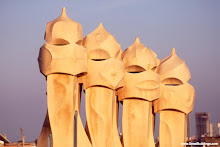Since today is St. Patrick's day, I'm going to rant a little.
I don't like what has happened to the ancient and venerable feastday of St. Patrick. It has turned into a debauchery of drunkenness and a tip of the hat to all things Irish. Not that honoring our Irish heritage is a bad thing, but we must remember, before and above anything else, His Grace was a bishop of the Church not very long after Gaelic Ireland (as a sociopolitical entity, not, of course, the island) came to historic knowledge. And by "the Church" (since we ARE talking about the 400's AD here), I mean the Church now known as the Orthodox church. The distinctive doctrines that make the Roman Catholic Church what it is today were not believed by anyone in the 5th century and wouldn't even be made mandatory or professed liturgically till 1014 AD, a mere 40 years before the Great Schism.
The other big surprise for many, will be that he wasn't actually Irish! He was born in Roman Britain of Brythonic heritage (Brythonic is Welsh, Cornish, or "P-Celtic" as opposed to Irish and Scottish "Q-Celtic). Here's an icon and his story:
Saint Patrick, the Enlightener of Ireland
March 17
March 17
Saint Patrick, the Apostle of the Irish, was seized from his native Britain by Irish marauders when he was sixteen years old. Though the son of a deacon and a grandson of a priest, it was not until his captivity that he sought out the Lord with his whole heart. In his Confession, the testament he wrote towards the end of his life, he says, "After I came to Ireland - every day I had to tend sheep, and many times a day I prayed - the love of God and His fear came to me more and more, and my faith was strengthened. And my spirit was so moved that in a single day I would say as many as a hundred prayers, and almost as many at night, and this even when I was staying in the woods and on the mountain; and I would rise for prayer before daylight, through snow, through frost, through rain, and I felt no harm." After six years of slavery in Ireland, he was guided by God to make his escape, and afterwards struggled in the monastic life at Auxerre in Gaul, under the guidance of the holy Bishop Germanus. Many years later he was ordained bishop and sent to Ireland once again, about the year 432, to convert the Irish to Christ. His arduous labours bore so much fruit that within seven years, three bishops were sent from Gaul to help him shepherd his flock, "my brethren and sons whom I have baptized in the Lord - so many thousands of people," he says in his Confession. His apostolic work was not accomplished without much "weariness and painfulness," long journeys through difficult country, and many perils; he says his very life was in danger twelve times. When he came to Ireland as its enlightener, it was a pagan country; when he ended his earthly life some thirty years later, about 461, the Faith of Christ was established in every corner.
Well, that's my "healthy dose of Orthodoxy" for this episode of my blog.
(Of note, I should explain that "veg*n" is a relatively new internet term (as far as I know) that encompasses everything from strict vegan to lacto-ovo vegetarian (which is just vegan with the addition of eggs and dairy products))


No comments:
Post a Comment